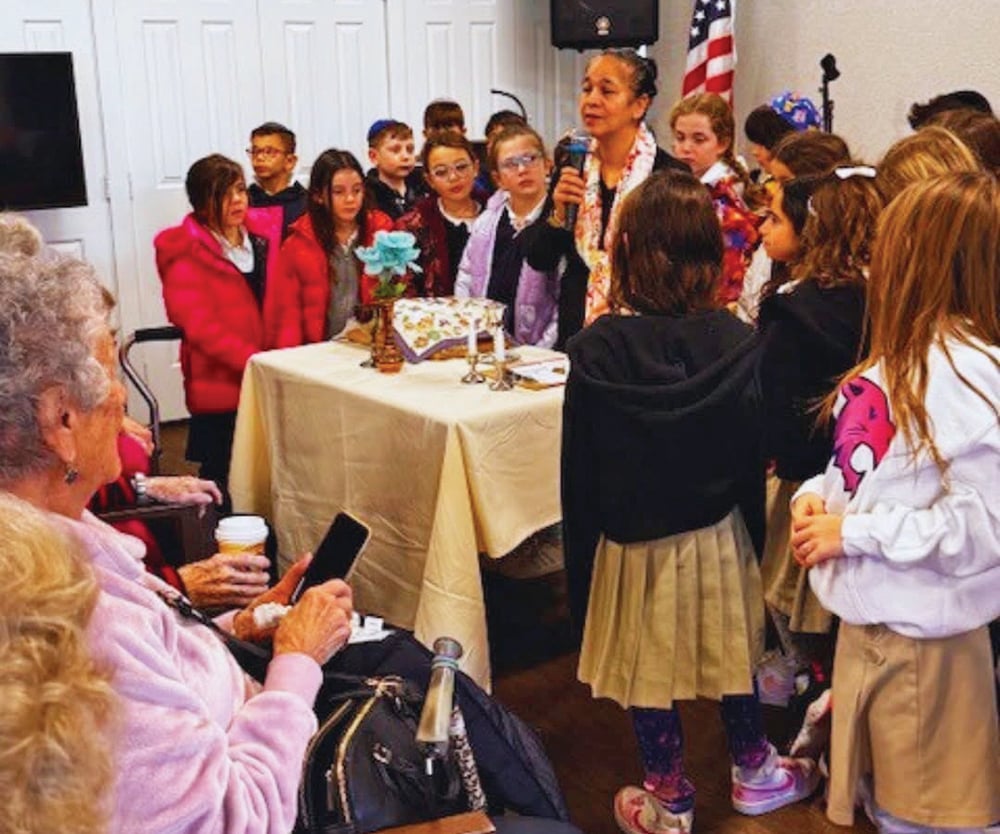
Last Tuesday afternoon I found myself walking into a kosher restaurant on Queen Anne Road, just a few doors down from West Englewood. It was warmly lit, moderately crowded and had a large sushi menu (like all reputable kosher restaurants and grocery stories), but what really caught my attention were the lengths of medical tubing coming out of the center of each table. I had wandered into Frum-Air, Teaneck’s new kosher oxygen bar.
A fad of the late 1990s, oxygen bars are an upscale version of the “air stations” found in Asian cities like Tokyo, where snorts of oxygen are sold, like coffee, from street-side kiosks. At Frum-Air, customers pay $17.95 for 20 minutes of 99 percent pure oxygen delivered through a small plastic piece, called a cannula, inserted into the nostrils. For an additional $2 the oxygen can be bubbled through a small Erlenmeyer flask containing water and one of the 31 different scented oils on Frum-Air’s scents menu.
Frum-Air is the brainchild of proprietor Yossi Averman, formerly a forensic accountant, who encountered his first oxygen bar two years ago during a business trip to Seoul, Korea. “My client wanted to take me out somewhere, but was frustrated when I explained that I could not eat in a non-kosher restaurant, did not drink and was happily married. He thought about it for a while, and 35 minutes later he dragged me into an oxygen bar. It was great,” says Averman.
During the 18-hour flight back from Seoul, Averman says “I decided I was going to open a kosher oxygen bar. I can’t believe that nobody has thought of this before. It’s the perfect thing for the frum community.”
As I looked around Frum-Air I was struck by the quiet, laid-back vibe the customers were giving off. Everyone seemed very relaxed. Shlomo Hockstein, a frequent Frum-Air customer, says that “I love taking oxygen, it seems to really improve my concentration. Lately my chavrusa and I have started to meet here to do the daf over lunch.” During my 90-minute visit to Frum-Air I noticed three other customers learning while taking the airs. Learning, by design, is very much a part of the atmosphere at Frum-Air, and the southern wall of the restaurant has three bookcases of seforim, giving the place something of a beis medrish feel.
“Beis Medrish” is also the name of what Averman tells me is one of the most popular aromas on his scents menu. Frum-Air has what is supposedly one of the largest scents menus available at any oxygen bar. In addition to oxygen bar standards such as Peppermint Passion, Citrus Sensation and Eucalyptus Mist, there are several Jewish-themed scents, all created under contract for Averman by Israeli aroma therapy giant Eiden Tepulit, Ltd. Choices under the heading “Hemishe Airs” include Meaty Chulent, Garlicy P’tcha and Bubbe’s House. “I really wanted to create modern olfactory experiences that are reminiscent of frum life,” says Averman. “That’s why I named my bar Frum-Air.”
After my chat with Averman, he sat me down at the bar, handed me a length of medical tubing, put six different flasks, each containing a different scent, in front of me. Over the next 20 minutes I moved my oxygen supply from flask to flask, sampling the different aromas. While I enjoyed both the food and oxygen during my visit (and managed to finish last week’s shnayim mikra) I am not sure I would want to pay to breathe pure oxygen on a regular basis, and suspect that a kosher oxygen bar will be just as much of a fad as the original oxygen bars were two decades ago. Regardless, for the time being, Frum-Air seems to be filling a niche that nobody knew even existed.
Below are my descriptions of the scents that I sampled while at Frum-Air:
Beis Medrish: This evocative aroma is truly redolent of a yeshiva beis medrish. The aroma is dominated by the smell of leather bookbindings and paper dust, with whiffs of stale sweat and mildew. (Averman tells me that they are developing an Israeli version of the scent that will have a higher ratio of sweat aroma and a strong note of cigarette smoke.)
Bat Ayin: Supposedly reminiscent of the smell of Israel’s groovy, Carlebachian yeshuv, look for aromas of incense, sweat and marijuana smoke (made using OU-certified medicinal marijuana) with just a hint of cattle dung.
Bubbe’s House: Pungent and not altogether pleasant, Averman says that this scent is a recreation of how his grandmother’s house used to smell during childhood visits on Friday afternoons. Look for the smell of mentholated cigarette smoke playing with notes of apple cake and brisket, and just a whiff of the chemical scent that comes from vinyl furniture covers.
Newborn’s head: Popular wisdom has it that the scent of a newborn baby’s head after a bath is the smell of Gan Eden. However, this scent merely smells like Johnson & Johnson Baby Shampoo and talcum powder.
Rebbe’s Tish: Perhaps the weakest of the scents I sampled, this air has elements of damp wool, freshly dry-cleaned silk, shoe polish and potato kugel.
Singles’ Shabbaton: I am not sure why anyone would want to pay for the aroma of a singles’ Shabbaton, but Averman seems to have successfully recreated that unique smell. It is an evocative and cacophonous mixture of clashing perfumes, deodorants and hair sprays, with whiffs of overcooked chicken and green beans.
By Kamliel Gronemer













